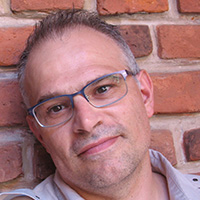
Carlo Cecchetto is currently “Professore Ordinario” at the University of Milan-Bicocca (3 months each year) and “Directeur de Recherché” at CNRS (Unité Mixte de Recherche 7023 “Structures Formelles du Langage” in Paris, 9 months each year).
After pursuing graduate studies at the Universities of Milan and Geneva, he has held research and teaching positions at San Raffaele Institute in Milan, at the Kanda University in Tokyo and at the University of Siena.
His research interests includes the syntax of natural languages, the study of the syntax-semantics interface, the role of working memory in language comprehension and the (psycho)linguistics of sign languages. His publication in the last ten years include numerous articles in peer-reviewed journals (including Language, Linguistic Inquiry, Natural Language Semantics, Natural Language and Linguistic Theory, Syntax, Lingua, Applied Psycholinguistics, Cognition, Cortex, Journal of Cognitive Neuroscience, Neuropsychologia, Cognitive Neuropsychology, Experimental Brain Research, Journal of Deaf Studies and Deaf Education and Aphasiology).
He has edited various books and has co-authored a monograph for MIT Press. He is currently the leader of a working package in the Horizon 2020 project SIGN-HUB (“The Sign Hub: preserving, researching and fostering the linguistic, historical and cultural heritage of European Deaf signing communities with an integral resource”).